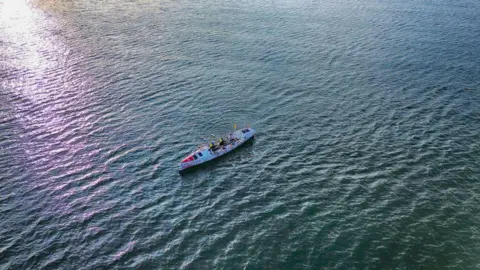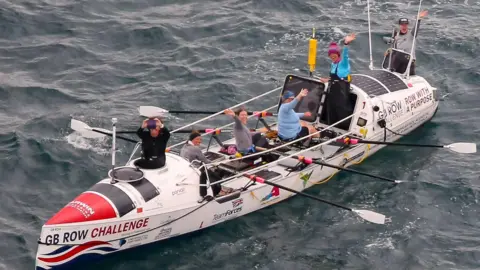Rowing research finds UK seas are warming
 GB Row Challenge
GB Row ChallengeData, collected by rowers who circumnavigated Great Britain and analysed by university researchers, has found that sea temperatures have risen.
A report by the University of Portsmouth and GB Row Challenge found UK seas were, on average, 0.39C warmer in 2023 compared to 2022.
The data was collected by a crew who took part in the 2023 GB Row Challenge which saw participants travel more than 2000 miles (3219 km) around Britain.
Professor of environmental pollution at the University of Portsmouth, Fay Couceiro, said: "We expect fluctuations but we don't want to see this increasing number of marine heatwaves."
Some regions, including the Celtic and Irish Seas and the northern North Sea, experienced temperature increases exceeding 2C, during a marine heatwave.
Prof Couceiro said the data gives an important indication of the health of our oceans.
"Understanding it allows us to better protect the species that are there," she said.
She added that sessile organisms like mussels and oysters, which are unable to move themselves to cooler waters. were most affected by the rising temperatures.
 GB Row Challenge
GB Row ChallengeEnvironmental DNA, underwater sound and microplastic data was also collected by the rowers.
Among the surprising findings was a fragment of Bakelite plastic found in Clacton-on-Sea north of the Thames Estuary.
Bakelite was the first commercially produced synthetic plastic, which was widely used in the early 1900s and largely discontinued in the 1940s.
"Despite being phased out of production decades ago, this possible century-old relic has persisted, highlighting how plastics can linger in ecosystems for generations," Prof Couceiro said.
"This longevity contributes to the accumulation of microplastics, which infiltrate our soils, waterways, and even the food chain, posing risks to both environmental and human health. The finding serves as a reminder of the urgent need for sustainable materials and robust waste management practices to address the escalating global plastic crisis."
'Citizen science'
Team Ithaca, an all-female rowing crew, were responsible for gathering the data.
The group also went on to become the fastest female team to row around Great Britain.
GB Row Challenge founder, William de Laszlo said: "Team Ithaca's expedition highlights the potential of citizen science in contributing to environmental research.
"Their dedication and resilience have not only set a new benchmark in ocean rowing but have also provided critical insights into the challenges facing Britain's coastal waters."
You can follow BBC Hampshire & Isle of Wight on Facebook, X (Twitter), or Instagram.
